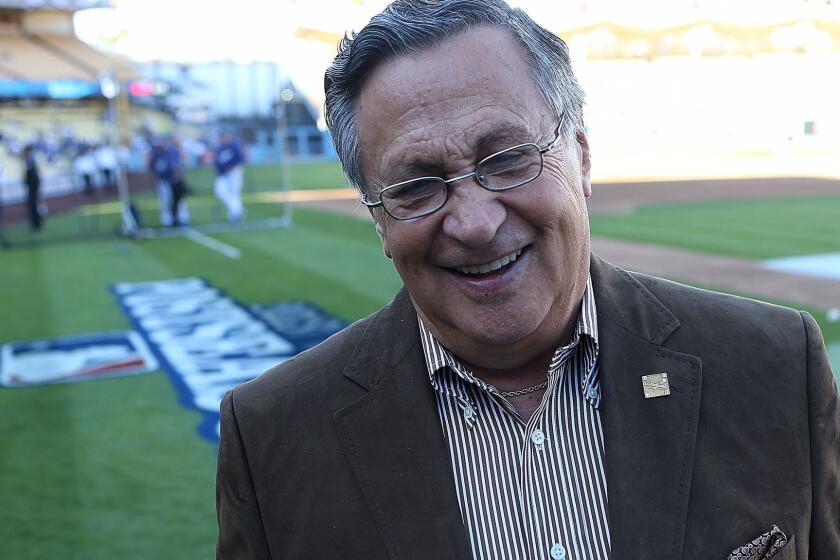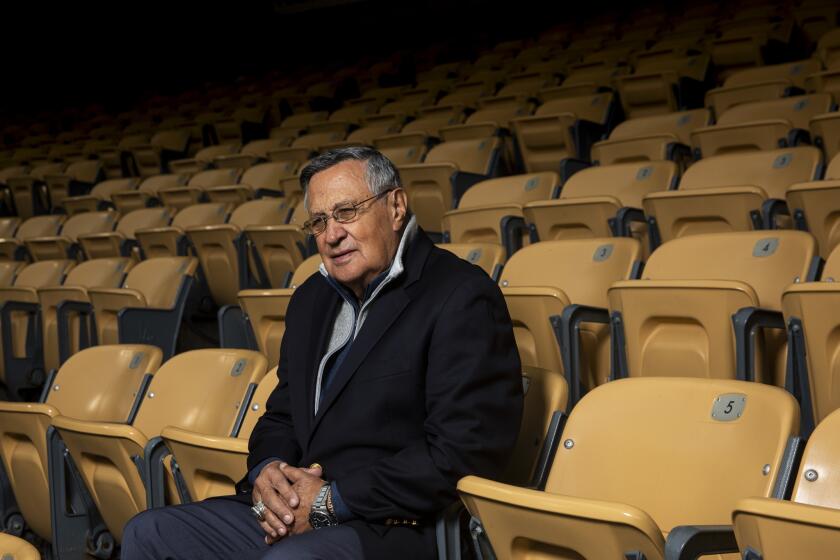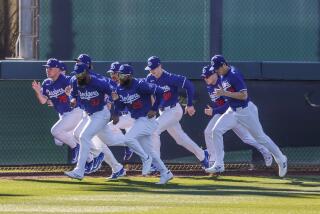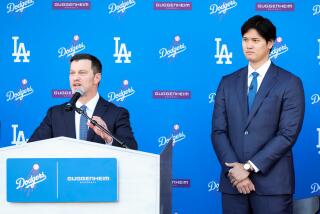Column: A hearty thank you to Dodgers legend Jaime Jarrín. ‘He made me believe that I belong’
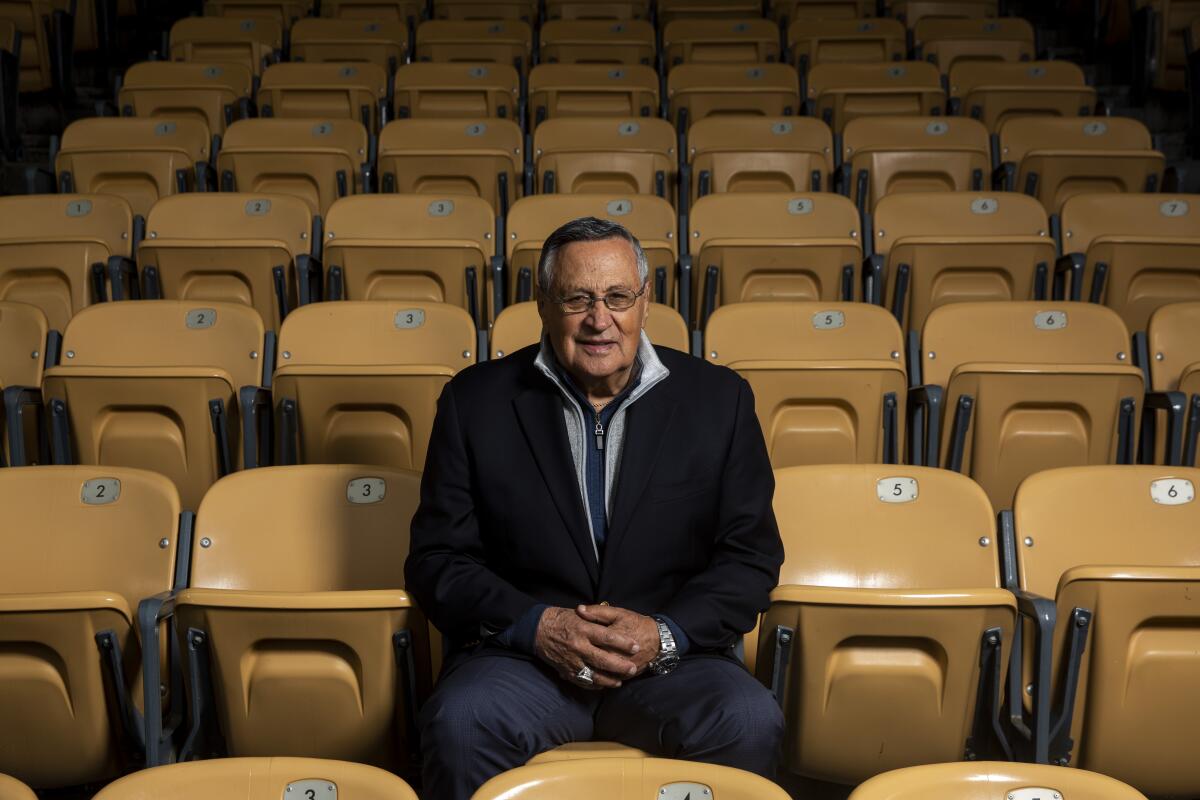
When Los Angeles Dodgers Spanish-language broadcaster Jaime Jarrín announced this week that he would retire in 2022 after a 64-year career, the first thing Jose de Jesus Ortiz did was look through his phone.
The 49-year-old is the founder and editor-in-chief of Our Esquina, a website that tells stories about Latinos and sports. Ortiz, a longtime baseball writer, said his publication “wouldn’t exist without Don Jaime. It’s not hyperbole.”

Fernandomania event
See Jaime Jarrín in person at our 'Fernandomania @ 40' event
We invite you to the exclusive finale celebration of ‘Fernandomania @ 40,’ our multi-episode documentary series that examines Fernando Valenzuela’s impact on the Dodgers, Major League Baseball and the Latino community in Los Angeles.
Join us Monday, Oct. 4 at the Montalbán Theater in Hollywood for screenings, and discussions with the stars of the documentary, including Ray Lara, Gloria Molina, Richard Montoya and Jaime Jarrín.
Buy your tickets here.
ESPN Deportes is the sponsor for this event.
Jarrín, you see, has been there at every part of Ortiz’s career. He was the voice narrating the Dodgers’ magical 1981 Fernandomania year, when Ortiz’s family was the only Mexican household on their block in Lynwood. Jarrín was there with a “Welcome, ¿como estás? ¿Como te llamas? [How are you? What’s your name?]” when Ortiz stepped into Dodger Stadium’s press box for the first time in 1994 as an intern with the Long Beach Press-Telegram.
As Ortiz’s career took off, and he bounced around from Florida to New York, Houston to St. Louis, Jarrín always made time to meet Ortiz for lunch, or catch up with a pregame chat. So when Ortiz finally figured out what he wanted to tweet, he posted photos he took with Jarrín. At an All-Star game with Los Angeles Times sports columnist Dylan Hernandez. With Ortiz’s now 18-year-old daughter when she was just a toddler.
One from this past July, when Ortiz bought upper-deck cheap seats at Dodger Stadium and the 85-year-old Jarrín trekked all the way up there to meet him and his family.
“I love the man because he made me believe that I belong,” Ortiz said, his voice trembling.
Jarrín’s announcement uncorked a parade of rightful tributes that will only escalate over the next 12 months. He and his fellow baseball Hall of Fame Dodgers broadcaster Vin Scully, after all, gave the Dodgers the greatest one-two punch in sports broadcasting history. Generations of Latinos — myself included — listened to Jarrín on AM radio with their Spanish-speaking parents. He not only told us about the Blue Crew’s exploits, he did it with a mellifluous, Neruda-esque Spanish that marked him as our collective fancy uncle who still showed up to all the family parties.
But there’s another Jarrín achievement — probably his most important one — that I didn’t consider until Ortiz and dozens of other Latino reporters across the country, in English and Spanish, posted their well wishes on social media. Jarrín isn’t just a beloved longtimer — he’s the spiritual godfather of every Latino in media.
In an era when Latinos are still fighting for proper media representation — when the issue remains so grave that the federal government just released a report on the subject — Jarrín has quietly shown us how to do it all along for decades. And he did it in a journalism genre — sports — far too often dismissed by activists as a wasteland of nothingness, even as they remain a cornerstone of life for so many Latinos.
Spanish-speaking counterpart to the legendary Vin Scully, announcer Jaime Jarrin gives lyrical play-by-plays. His fame was belated, and humility is his hallmark.
When we talk about creating a space for us, there was Jarrín helping to birth the role of Spanish-language sports broadcasting in the American West. When reporters fight for equity, there was Jarrín pushing Major League Baseball teams behind the scenes so that they offered their Spanish-language broadcasters the same travel privileges that the Dodgers gave Jarrín.
When we proclaim that mentoring young scribes is important to increase our numbers, there was Jarrín mentoring generations of them.
Longtime Southern California sports media personality Beto Duran remembers how he casually told Jarrín before a 2014 Dodgers game that he was going to announce his first boxing match.
“He sat me down for 15 minutes and told me his encyclopedia of how to do things,” said the Carson native, who’s now an analyst and play-by-play announcer for KCBS-TV Channel 2. “Did he have to do that for me? No. But Jaime is telling you how to do it, and then follows up a couple of months later and saying what you’re doing right, and what you can do better.
“That, right there,” Duran concluded, “is a Hall of Fame person, not just Hall of Fame broadcaster.”
Everywhere he goes, he is serenaded, by restaurant busboys and city officials, from the bleacher seats to the dugout club, his life reflected in the singing of a call that has become a connection.
Jarrín’s career in the United States is a testament to what Latinos can do if they get a chance to join the big time — and should do once they’re there.
The native of Ecuador covered JFK’s funeral, the Watts riot, and the 1970 Chicano Moratorium when a fellow journalistic trailblazer, L.A. Times columnist Rubén Salazar, was killed by a teargas canister fired by a sheriff’s deputy. Jarrín filed dispatches from the Olympics and boxing matches, visits by Latin American leaders and Pope John Paul II to the United States.
And, oh yeah, he called nearly every Dodgers game over the span of six decades, a game he knew nothing about when he arrived in the U.S. in 1955.
He didn’t have to do all that extra hustle — but Jarrín did it, because he never took his success for granted, and didn’t want to be pigeonholed to one thing.
“Jaime always brought that part of the immigrant story,” said Cal State Channel Islands Chicano Studies professor Jose Alamillo, who has published books and scholarly articles about Latinos and baseball. “God, Jaime was able to work hard and look for those opportunities and made it big in baseball, which wasn’t even his first sport!”
Alamillo also pointed out that Jarrín brought a “familia” aspect to his work that made his very presence so important to Latino representation in popular culture.
“When we’re so sick of all these negative images of us on the media, he’s that calming voice that brings a positive narrative of who we are, by just calling a ballgame,” he said. “His voice carried into a wider reach than we think of. It’s an unappreciated part of who he is.”
Jaime Jarrin, 84, was set to begin his 62nd season as the Dodgers’ Spanish-language broadcaster. Instead, he is home gorging on SportsNet LA content.
I’ve talked to Jarrín just once — for a story that I wasn’t able to ultimately cover. But that one time, he unwittingly offered a lesson that stayed with me: Never forget where you came from, which is something too many people who make it sadly do.
In June, Jarrín invited some of the Dodgers’ Latino players to go visit hundreds of migrant children then temporarily sheltered at the Long Beach Convention Center.
“They immediately got it,” Jarrín said of Dodgers players like Hall of Fame-bound Albert Pujols and staff ace Julio Urias, who ultimately joined him. “I remembered when I came to this country. To come to a foreign country, with a different culture, it’s difficult at 19. At their age, away from their parents? I couldn’t imagine it. The children are Latinos, so we just wanted them to know that they’re not alone.”
That they, in other words, believe that they belong.
More to Read
Start your day right
Sign up for Essential California for news, features and recommendations from the L.A. Times and beyond in your inbox six days a week.
You may occasionally receive promotional content from the Los Angeles Times.

